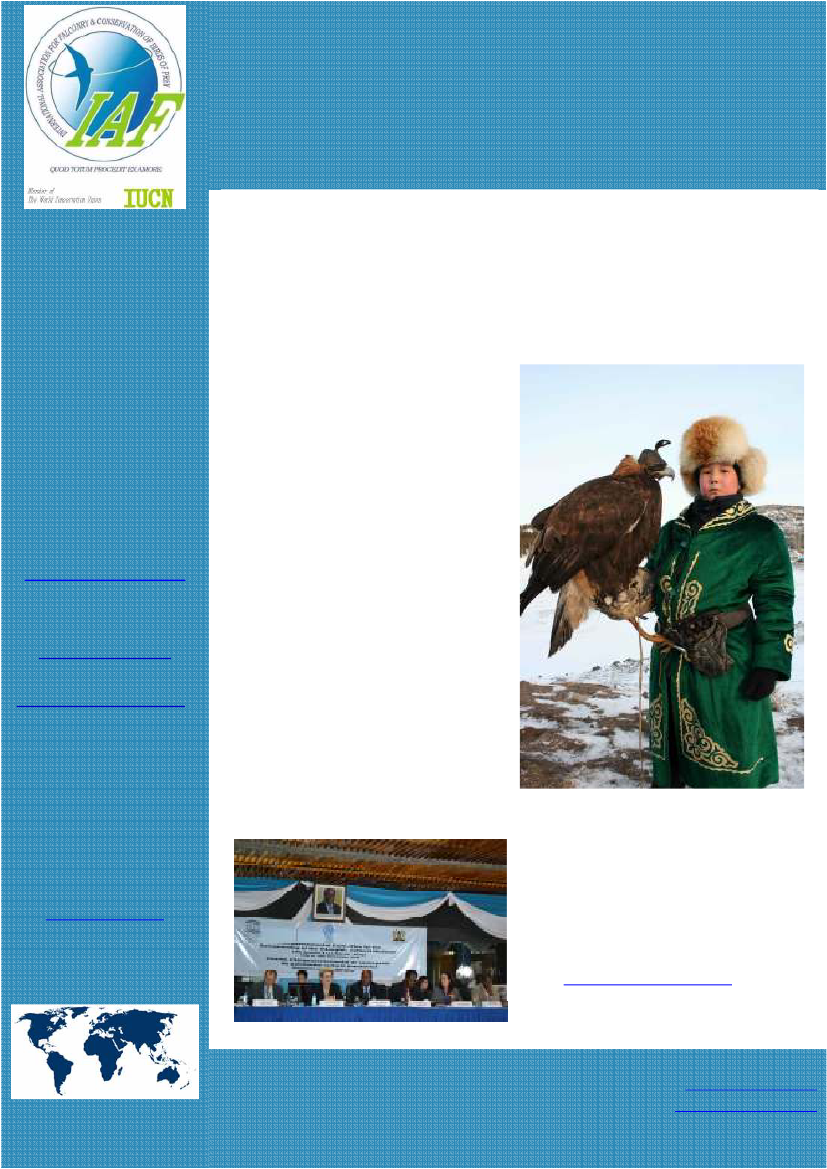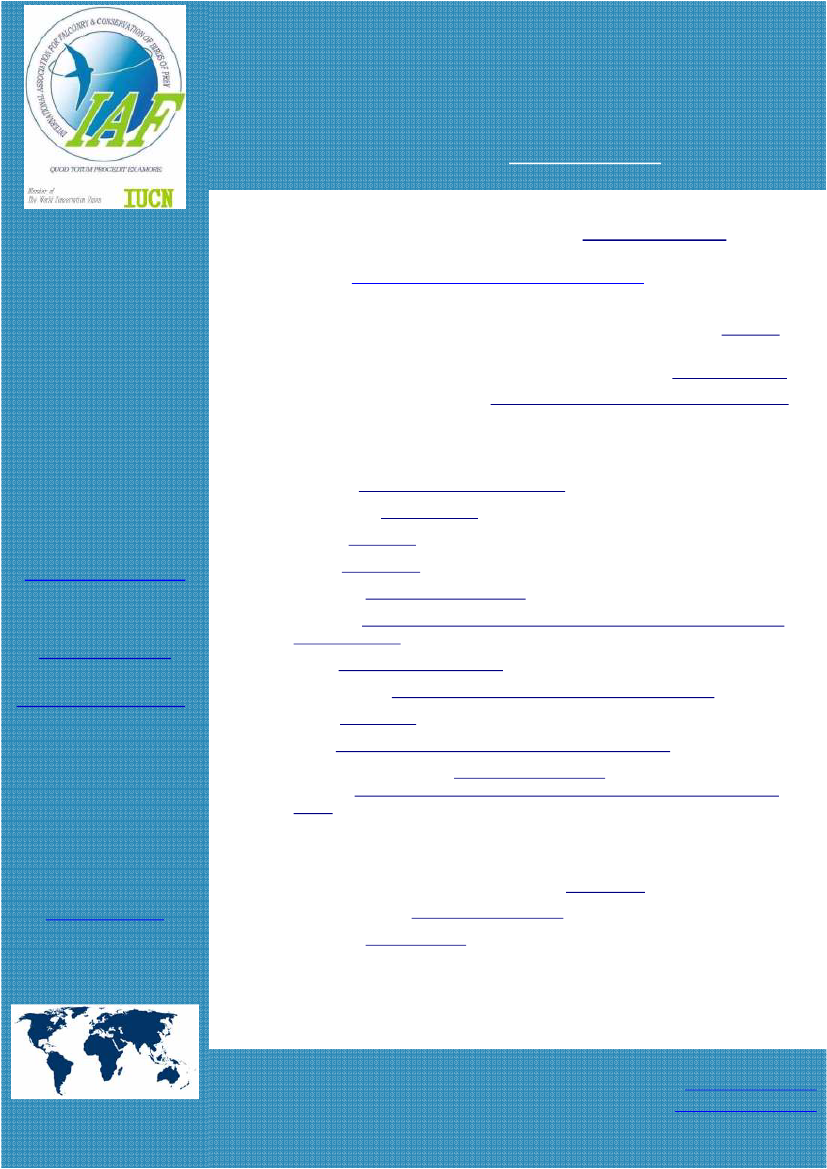Miljø- og Planlægningsudvalget 2010-11 (1. samling)
MPU Alm.del Bilag 155
Offentligt
International Association for Falconry andConservation of Birds of Prey
UNESCO RECOGNISESFALCONRYThe I.A.F. currentlyhas 70 associationsfrom 50 countriesworldwide totalling30,500 members.The International Association for Falconry and Conservation of Birds of Prey(IAF) is delighted to announce that Falconry, an ancient hunting art that hascaptured the imagination of mankind for over 4000 years, has been placed byUNESCO on the Representative List of the Intangible Cultural Heritage ofHumanity at a ceremony in Nairobi today 16thNovember 2010.Falconry is the art of hunting with trained birds of prey, a tradition that hasappeared in a host of historical settings from the royal courts of Asia toMedieval Europe and on into the New World.In recent times, falconers haveplayed a vital role in the conservation ofwildraptorsandtheirpreyspecies, while passing this heritage on tosubsequent generations and instilling anappreciation of wildlife and tradition intheir children. This recognition byUNESCO is of major importance toanyone with an interest in heritage orconservation; two areas under threat andones we feel are valued highly by yourreadership and editorial team. Thereforewe would ask you consider thisUNESCO announcement for content in aforthcoming edition of your paper.Falconry and bird of prey-related storiesare eye catching in any publication; evenpeople with little interest in animals arecaptivated by the noble beauty of eagles,hawks and falcons. We offer some hi-resolution images of such birds for usewith any coverage you could provide forthis recent UNESCO announcement. Forfurther information, I refer you to theattached press release. If I can be of anyhelp whatsoever, do not hesitate tocontact me on +353 87 133 0922
Contacts inInternationalAssociation forFalconry andConservation ofBirds of PreyPresident - Frank Bond (US):
[email protected]Vice-president for Europe,Asia, Africa, OceaniaDr. Bohumil Straka (Czech)
The inscription of Mongolian Falconry ontoUNESCO’s list ensures the continuance of theway of life of the Kazakh falconers of the BayanUlgii region of Mongolia .
Website:www.iaf.org
Yours sincerely,Gary Timbrell (Ireland)PRO for the International AssociationEmail:[email protected]
International Association for Falconry andConservation of Birds of Prey
PRESS RELEASE
16thNov 2010
Website:www.iaf.orgThe I.A.F. currentlyhas 70 associationsfrom 50 countriesworldwide totalling30,500 members.
United Nations declare ancient hunting asglobal cultural heritage“FALCONRY is a Living Human Heritage”Today in Nairobi, Kenya, the United Nations Educational Scientific and Cultural Organisation(UNESCO) Intergovernmental Committee for the Safeguarding of the Intangible CulturalHeritage added Falconry, a traditional hunting method, to its List of the Intangible Cultural Heritage ofHumanity. Since before the time of the pyramids, over 4000 years, falconry as a hunting method hasretained an unbroken thread of tradition. Fathers have been passing down skills to their children forstnearly 200 generations in a chain of intangible heritage, bringing this art to us, the 21 century.Today's modern lifestyle and rapid urbanisation have restricted opportunities to practise falconry. Thishas been leading to a dangerous decline in many countries. Migration from countryside to towns is amajor threat to rural-based traditions and UNESCO's World Cultural Heritage lists ensure signatorygovernments protect traditions such as: traditional skills, knowledge and rituals, handicrafts, song,dance, art and poetry or practices related to nature. "Traditional Falconry is exceptional in that it fulfilsall of these," said Frank Bond, President of the International Association for Falconry.This is the largest ever nomination in the history of the UNESCO convention and was presented byeleven nations: Belgium, the Czech Republic, France, Korea, Mongolia, Morocco, Qatar, SaudiArabia, Spain, Syria and the United Arab Emirates. The Abu Dhabi Authority for Culture and Heritagetook the lead in co-ordinating this massive submission and UNESCO officials wrote during theinscription process that "…this is an outstanding example of cooperation between nations".From its ancient beginnings in the Middle East falconry is now practised on all continents and hasgiven the entire world so much. Bond pointed out, "There are a thousand falconry words in commonlanguage, some common to many languages. For example: even the universal term 'gentleman' isderived from falconry vernacular implying a man who could fly a female peregrine, the 'falcon gentle';falconers gave the world the first scientific book on nature'De arte venandi cum avibus';wars haveeven been avoided and stopped by diplomatic gifts of falcons." Mme. Veronique Blontrock fromBelgium noted that: "In Belgium today children use a book on falconry to learn to read Flemish." Dr.Bohumil Straka of the Czech Republic said: "Flights out of major airports are protected by falconerswho prevent bird strikes and save human lives.The UNESCO submission stated "Falconry is one of the oldest relationships between man and bird,dating back more than 4000 years. Falconry is a traditional activity using trained birds of prey to takequarry in its natural state and habitat. It is a natural activity because the falcon and her prey haveevolved together over millions of years; their interaction is an age-old drama. The falcon is adapted tohunt the prey, and the prey has evolved many ways to escape from the falcon. This leads to afascinating insight into the way nature works and poses an intellectual challenge to the falconer in hisunderstanding of behaviour. His task is to bring the actors together on nature’s stage. To do this thefalconer must develop a strong relationship and synergy with his bird."Falconry is considered a low-impact activity; falconers understand that their hawks and quarry speciesmust be preserved and have been practicing ‘sustainable use’ for centuries. His late Highness SheikhZayed bin Sultan Al Nahyan said, “It is not what you catch that is important; it is what you leavebehind”. Professor Tom Cade of the Peregrine Fund pointed out: "Falconers have been instrumentalin the worldwide recovery of the endangered peregrine falcon and are involved in many conservationprojects."Falconers share universal principles. The same methods of training and caring for birds, theequipment used and the bonding between man and the bird are found throughout the world. It is thesecommon shared traditions and knowledge that make falconry universal and keep it alive, even thoughthese traditions may differ from country to country. "This recognition by UNESCO means a great dealto the preservation of a traditional way of life in many countries," said Frank Bond.In the 13 century Marco Polo at the court of Khublai Khan (a grandson of Ghengis), described anassembly of 10,000 falconers. To celebrate this exceptional achievement 10,000 falconers fromaround the world are expected to assemble again, this time in Abu Dhabi in December 2011. Seewww.falconryfestival.com .th
Contacts inInternationalAssociation forFalconry andConservation ofBirds of PreyPresident - Frank Bond (US):
[email protected]Vice-president for Europe,Asia, Africa, OceaniaDr. Bohumil Straka (Czech)
Website:www.iaf.org
International Association for Falconry andConservation of Birds of Prey
SOME USEFUL LINKSWebsite:www.iaf.orgFor more information onUNESCOseewww.unesco.orgTo see a full copy of the actualsubmission
documents, submission photographsand video go towww.unesco.org/culture/ich/print.php?lg=ar&pg=00335#top(document 6.45 foot of page)Forinternational falconry
today and the history of world falconry seewww.iaf.orgalso for some ideas onphotographs
available on requestFor information onconservation
and thePeregrine Fund
seewww.peregrinefund.orgForMarco Polo
andKhublai Khan
www.eaglehunter.co.uk/Vadim_Gallery/VG_19_Kublai_KhanFor someinformation
on falconry in the submitting countries1:•••President - Frank Bond (US):
The I.A.F. currentlyhas 70 associationsfrom 50 countriesworldwide totalling30,500 members.
Contacts inInternationalAssociation forFalconry andConservation ofBirds of Prey[email protected]Vice-president for Europe,Asia, Africa, OceaniaDr. Bohumil Straka (Czech)
Belgium
www.associationdesfauconniersbelges.be(official comprehensive site)Czech Rep.
www.sokolnictvi.net(official comprehensive site)France
www.anfa.net(official comprehensive site)Korea
www.falconry.kr(site with articles)Mongolia
www.eurasianet.org/node/61713(article)Morocco
www.eljadida.ma/.../la-fauconnerie-au--maroc--plus-qu-une-tradition--un-patrimoine-a-preserver--a1577.htm(article)Qatar
www.qmsf.com/falcon/wind2.html(site with articles)Saudi Arabia
www.ada.gov.sa/Eng/Sports/Left/Traditiona/Falconry.doc_cvt.htm(article)Spain
www.aecca.org(official comprehensive site)Syria
www.openwriting.com/archives/2008/05/falconry_with_s.php(article)United Arab Emirates
www.uaeinteract.com/falconry/(official comprehensivesite)andwww.thenational.ae/guide/historical/flora-and-fauna/falcons/unesco-weighs-protecting-falconry(article)••••
Other useful websites;
Website:www.iaf.org
••
North American Falconers’ Association:www.n-a-f-a.orgUnited Kingdom:www.britishfalconersclub.co.ukGermany:www.falkenorden.de
•
1
Where official websites do not exist a link has been provided to the best of the other sites available.



